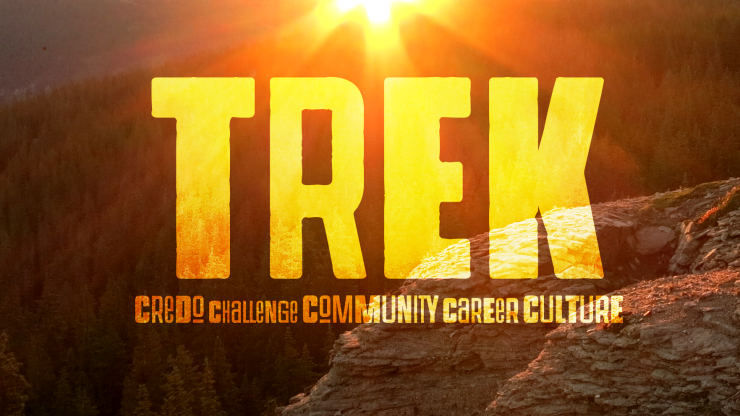TREK, a central component of Centenary's curriculum, combines the best traditions of the liberal arts with the real world knowledge and skills required of leaders in the 21st century. TREK begins with the first-year courses CREDO and CHALLENGE, designed to prepare students to succeed both academically and professionally.
During the sophomore, junior, and senior years, TREK encourages exploration of COMMUNITY, CAREER, and CULTURE in courses that incorporate distinctive, experience-based programs for students to enhance their self-knowledge and social awareness through career and graduate school preparation, intercultural engagement, and civic involvement.
See what our first-year TREK students have been up to at the TREK: Challenge 2018 Research Conference, April 23 - April 27. A full schedule of presentations can be found here.
First-Year TREK Courses
Centenary students begin their TREK in their first year with two courses designed to cultivate the habits of mind characteristic of a person educated in the liberal arts, including intellectual curiosity, critical inquiry, thoughtful communication, problem solving, and respectful engagement with others. For more information about the first-year TREK program, contact Dr. Jeanne Hamming, Professor of English, at jhamming@centenary.edu or 318.869.5082.
credo(TREK 115)
Credo is Latin. It means, "I believe." It's a creed, a code that guides our words and actions in the real world. This course, the first in a two-course sequence for first-year students, allows students to explore their values and beliefs, particularly in the context of their academic ambitions. This is where your TREK begins, with an exploration of self and society and ample opportunities to develop the fundamental skills and insights that will best prepare you for the adventures ahead.
challenge (TREK 116)
Rapid technological developments, economic expansion, globalization, human-created changes to our environment, conflict. These are among the myriad factors that contribute to the complex global challenges we face in the world today. During their second semester of TREK, students select from a range of CHALLENGE seminars, each offering in-depth, research-driven investigations into some of the most pressing concerns of the 21st century. CHALLENGE seminars are led by innovative faculty who contribute their own passion and expertise to explorations of emerging and enduring challenges.
Experiential Learning through TREK
The experiential learning opportunities gathered under TREK (COMMUNITY, CAREER, CULTURE) serve as an interface between our students' academic lives and their lives beyond Centenary as working citizens, as contributors to their own communities, and as members of a global community. Courses, internships, and research opportunities designated as "experiential" offer personal, meaningful, and distinct experiences that connect classroom learning to practical living. Making such connections transforms learners into thinking doers.
Through courses and opportunities offered through the offices of Career Services, Community Engagement, and Intercultural Engagement, TREK provides students with opportunities to:
- Integrate experiential learning into our traditional academic context, so students can link classroom learning with practical application.
- Understand that social interaction is an integral part of education.
- Recognize their roles as citizens and leaders responsible for meeting the challenges of an ever-changing world.
- Realize that personal reflection about their engagement with the world beyond the classroom can lead to real self-knowledge and social awareness.
COMMUNITY (TREK 151/153)
Membership in a thriving community is essential to our happiness. At Centenary, students learn the important role they play, as responsible citizens, in maintaining and improving the communities in which they live and work through the COMMUNITY component of TREK. Students have a number of pathways for fulfilling this requirement, including internships, designated courses, and approved module or immersion courses.
Contact:
Kaylan Walker, Director for Community Engagement
kwalker@centenary.edu
career (trek 250/251/253)
Through the CAREER component of TREK students develop critical career related skills and also undertake systematic inquiry into an analysis of graduate programs or professions they may pursue. Through this program, students gain critical self-knowledge, social awareness, and professional acumen. Students may earn CAREER credit through internships, designated courses, or designated guided research projects.
Contact:
Rachael Peters, Director of Career Services
rpeters@centenary.edu
318.869.5360
culture (trek 300/351)
The CULTURE component of TREK provides opportunities for students to gain personal and intellectual insights through direct interaction with people of a different culture. These experiences enable students to understand how their own culture's values, beliefs, heritage, and history shape their views of the people they encounter whether in the United States or abroad. Students have three options to immerse themselves in the study of a culture that is different from mainstream culture:
- Student may study internationally in a foreign culture.
- Students may study culturally distinct groups in the United States who have substantially different regulations, norms, and ways of life from mainstream U.S. culture.
- Student may study subcultural groups who are part of mainstream culture (ethnic, racial, class, sexual identity, etc.) but differ significantly from mainstream cultural experience.
Students may satisfy the CULTURE requirement through international exchange or study abroad, an approved Intercultural Experience course or Independent Culture Project, modern language study, or an approved module or immersion course.
Contact:
Anne-Marie Bruner-Tracey, Director of Intercultural Engagement
intercultural@centenary.edu
318.869.5059
Full TREK requirements and course descriptions are available in the Centenary College Catalogue.

